Items
Tag is exactly
Lockdown
-
0012-03-20
The Day the World Changed
On March 12th, 2020, I found out the fate of the remainder of my first spring semester as a college student. I don’t remember much about days during quarantine, but I do remember specific details of this day. It was the week before Spring Break for UAB, and all students were preparing for a week off from school. That weekend, my family was planning a trip to New Orleans for the weekend as my mother’s employer offered her a free two-night stay at any hotel of her choosing. My dad and I were planning to finally visit the National World War Two Museum. As my friend and I were walking to dinner at a local poke place in Five Points South, I received my first email that my English class would remain virtual for the remainder of the semester. My professor had Type 1 Diabetes and did not want to risk his health. Shortly after, the entire student body of UAB received an email that students would not return to campus until April 1st, 2020, at the earliest. While some students decided to pack up all of their belongings and take them home with them, others truly believed we would be coming back on April 1st. I decided not to take my belongings with me and traveled four hours to my hometown for the extended break. I went home that Friday, March 13th, 2020, after taking my midterm for Biological Anthropology. Once I arrived home, my parents made the decision to cancel our trip as the spread of COVID-19 was unknown at this time, and they did not want to risk going to a public and crowded place like New Orleans. Instead, my father and I traveled four hours back to Birmingham to pack up my dorm room and bring my belongings home. At this time UAB had completely shut down and was limiting access to campus and the dorms. They only allowed me 15 minutes to get any belongings needed. After that trip, UAB officially closed for the remainder of the term and students belongings were moved out of the dorms by moving companies to make room for healthcare workers. We did not get the chance to go on our New Orleans trip until over two years later, in 2022. I planned a big trip for my 21st birthday with my friends and family. While most restrictions have been lifted, people were still wearing masks, and businesses were still enforcing the three- to six-foot social distancing. I wasn’t surprised, as just earlier in the year, my employer required face masks for the spike in COVID cases in Birmingham. I remember going to restaurants and we were required to wait outside for our table. In the National World War Two museum, there were stickers on the floor that represented how far we should stand from each other. While many of the restrictions, including the social distancing and wearing a mask, had been lifted, it was nice to see that people were still making it a point to follow them for the safety of themselves and others. -
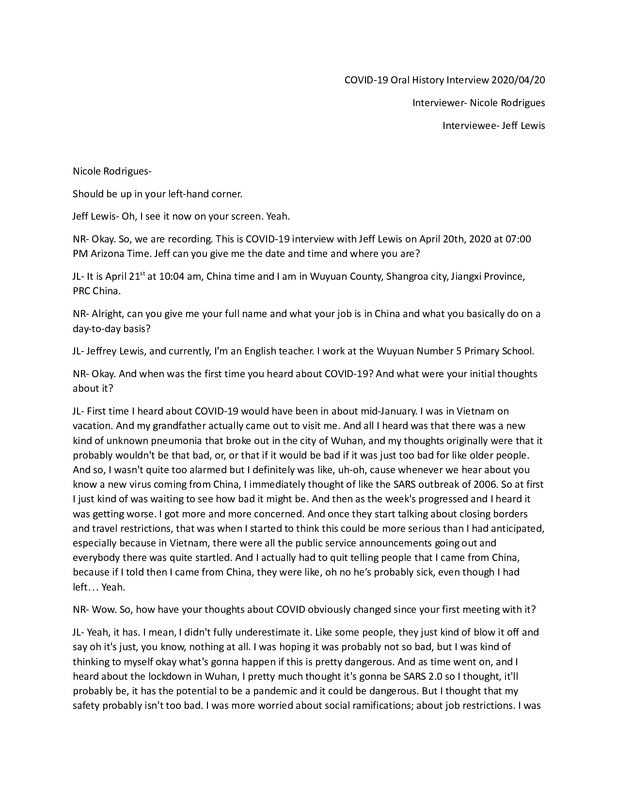 04/20/2020
04/20/2020Jeff Lewis Oral History, 2020/04/20
-
2020-03-14
My Sedentary Lifestyle Prepared me for What Came
In the year of the pandemic I was not aware of everything that was occurring all around me, I did not watch the news; however, I did get news updates on my phone and people would tell me what was going on. I was working as a personal attendant at an elementary school when covid began, and I did not feel the effects that covid 19 has been changing society, the community that I lived in, and in my life until the lockdown began where everyone had to stay inside their houses. Before the lockdown began I was living a sedentary lifestyle where I would spend the whole day inside the house on my phone or watching TV, so staying in my house was an everyday thing for me and many of my family members and friends did not live near me, so I would always call them; however, I have heard about a couple of family members who I have grown up with mention to me that they had covid and before I returned to work after the lockdown was over my mother tested positive for covid, so this is when covid 19 was hitting hard to me because many people that I was close to were getting sick, when my mother was sick I began to worry whether I had covid 19, because I fell ill before her, however, I tested negative for covid 19 which I admit was a huge relief for me, but I was worried about my mothers well being, until she felt better. In news updates I heard about a lot of people who lost their jobs, and places that were shut down, because of the pandemic, so I felt fortunate to still have employment at the elementary school even if my hours were shorter than before because of the changed school hours, but I still felt fortunate that I still had employment and that none of my friends or family lost their lives to covid 19. When I first heard about the lockdown it was when I realized how truly serious the situation was, many people had trouble staying inside their houses during the lockdown; however, I always stayed inside on my phone, playing video games, and watching TV so remaining in my house was never such an issue for me since this was part of my everyday life so my sedentary lifestyle is what prepared me and got me through the lockdown during covid 19. -
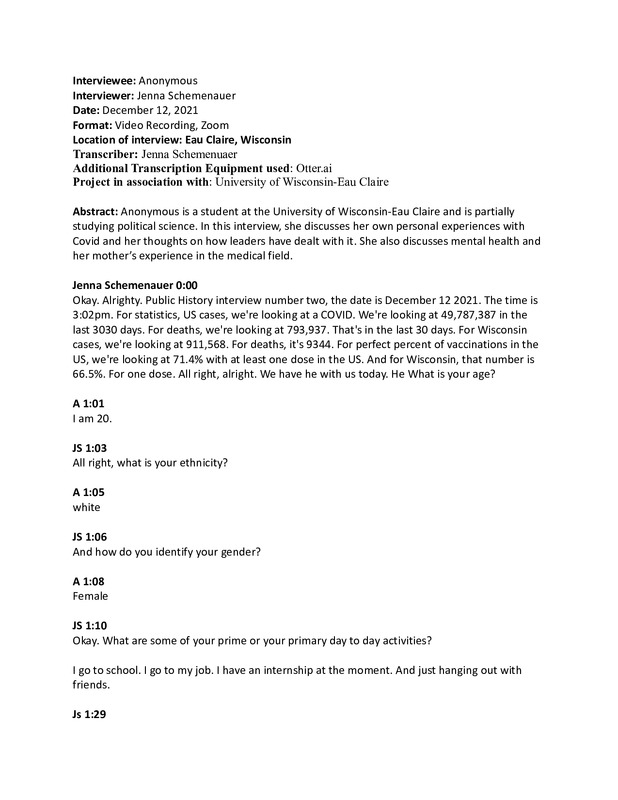 12/12/2021
12/12/2021Anonymous Oral History, 2021/12/12
Anonymous is a student at the University of Wisconsin-Eau Claire and is partially studying political science. In this interview, she discusses her own personal experiences with Covid and her thoughts on how leaders have dealt with it. She also discusses mental health and her mother’s experience in the medical field. -
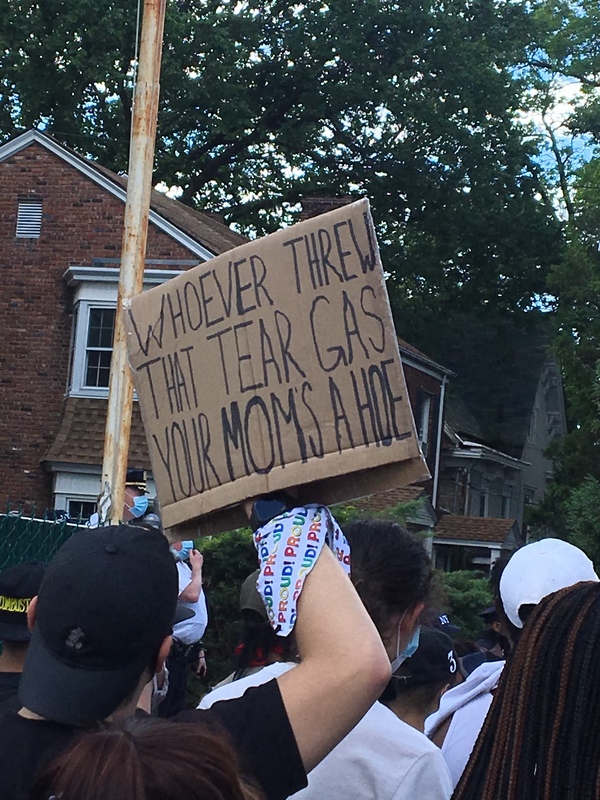 2020-06-09
2020-06-09George Floyd protest
“This is from a protest on June 9th, 2020 I went to, which was in protest of the police and George Floyd’s death. The sign spoke to me and it’s the only picture I have from that day. But I feel like I was part of history that day. It was the first thing I went to with my friends or people since the lockdown started. Before that, I was alone with my family and my thoughts. And so it marked the beginning of a new world of change that we embarked upon.” -
2020-05-02
Social distancing
This photo is taken from the CSI Public History Coronavirus Chronicle Facebook page. (May 2, 2020, author unknown) I look at this photo and remember when social distancing was still fresh and new and everyone did it. Now, it feels like people are starting to lose that boundary of personal space and wanting to stand as close as they can behind you in a check out line. I remember actually enjoying the distance people were forced to take, and a part of me wishes social distancing was still in effect. -
2020-04
Getting Our Time Back
The Covid-19 Pandemic was a hard time for everyone. People were sick, out of work, losing loved ones, and going through several other mental and physical health problems. However, we also had a lot of time on our hands during the pandemic, and my family took the as the perfect opportunity to bond. During the pandemic, we spent a lot of time together, we would paint, talk, watch movies, play games, basically anything we could do get together. This gave me the chance to grow closer with my family during a hard time and I really cherish the time we spend together. . -
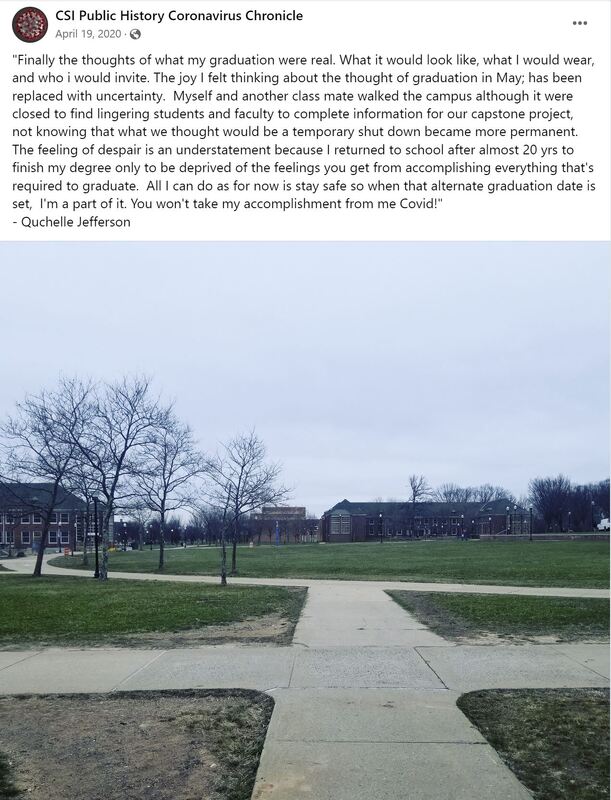 April 19, 2020
April 19, 2020CSI Class of 2020
"Finally the thoughts of what my graduation were real. What it would look like, what I would wear, and who i would invite. The joy I felt thinking about the thought of graduation in May; has been replaced with uncertainty. Myself and another class mate walked the campus although it were closed to find lingering students and faculty to complete information for our capstone project, not knowing that what we thought would be a temporary shut down became more permanent. The feeling of despair is an understatement because I returned to school after almost 20 yrs to finish my degree only to be deprived of the feelings you get from accomplishing everything that's required to graduate. All I can do as for now is stay safe so when that alternate graduation date is set, I'm a part of it. You won't take my accomplishment from me Covid!" -
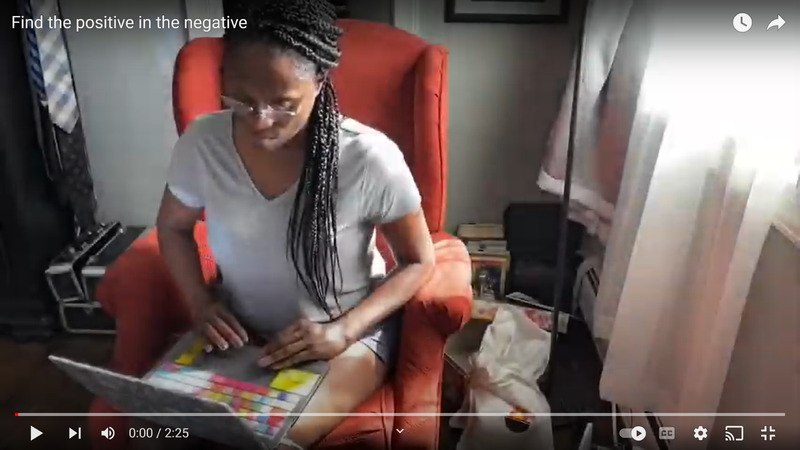 April 8, 2020
April 8, 2020Find the positive in the negative
a look at the everyday life of Gabriella Bartley during the height of the 2020 pandemic -
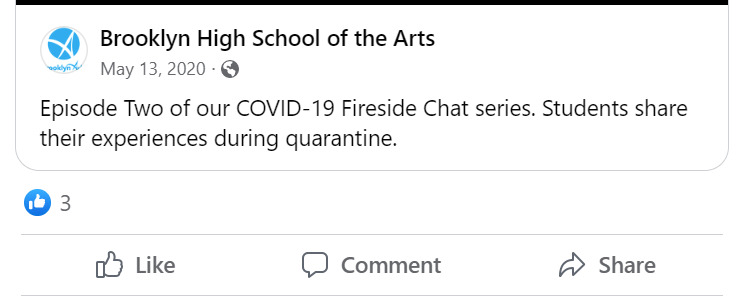 2020-05-13
2020-05-13Covid-19 Fireside Chat Series: Episode Two
A virtual chat series that was shot during lockdown. This episode covers students talking about their experiences during lockdown -
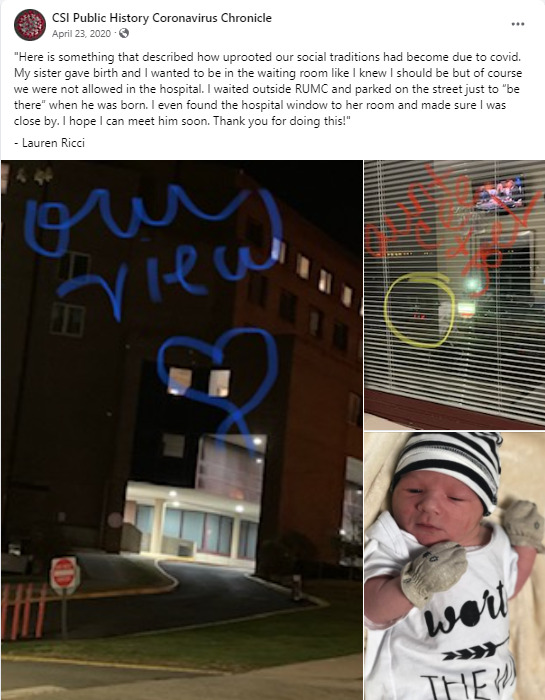 April 23rd, 2020
April 23rd, 2020Hospital During Lockdown
What Hospitals were like doing during lockdown -
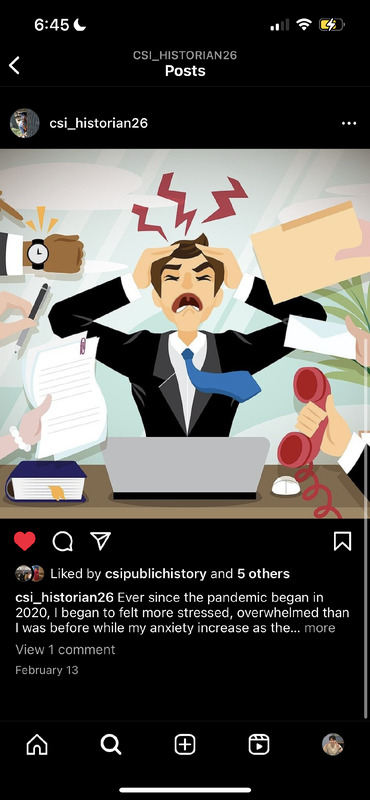 February 13th, 2023
February 13th, 2023Status of Mental Health During Lockdown
I was overwhelmed and stress when we went to online classes. The photo I posted is a representation of how I felt during that time -
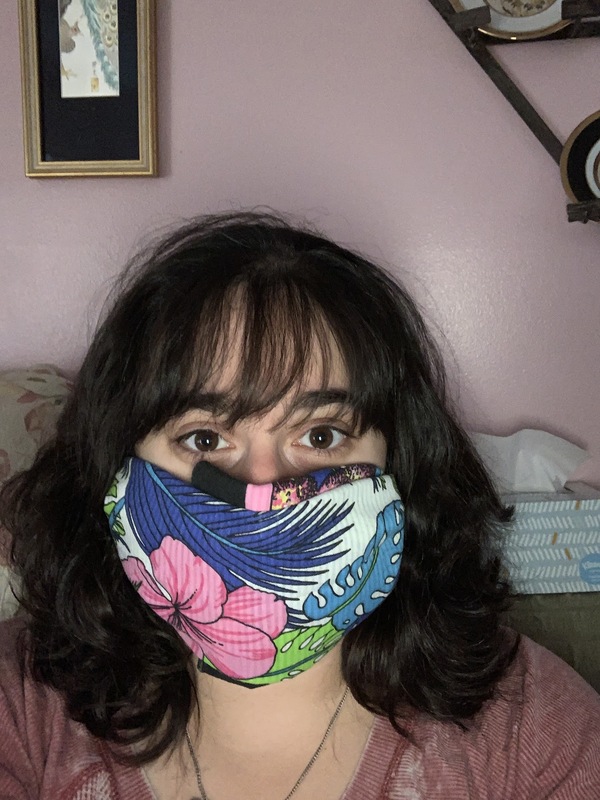 April 10, 2020
April 10, 20202020 Grocery Store Fashion
“This morning’s grocery store fashion,” I wrote on April 10, 2020 when I posted this photo to Instagram. I tagged #socialdistancing #maskedcrusader and #newyorktough. This was the first time I wore a mask when I left the house and it was one of only a few times I’d gone farther than my backyard or front stoop since lockdown began the month prior. I had been listening to public health officials who advised wearing “face coverings” to help “flatten the curve” (reduce the number of new infections to prevent overcrowding in hospitals). I also followed their advice to opt for cloth and save the real masks for health care workers on the “front lines” of the pandemic who were facing a shortage of “PPE - personal protective equipment.” So many new words and phrases had entered the lexicon and I was struggling to keep up. Masking felt like a way I could protect myself and family and contribute to the effort to squash Covid-19. I found a video tutorial for how to make a “no sew” mask using a bandana folded over hair ties for ear loops. I added a coffee filter in the middle of the folds for good measure. I used this type of mask into the summer of 2020 when I realized masks weren’t going away anytime soon and started wearing more fitted cloth versions. I remember masking felt strange and changed the way I interacted with people I passed who couldn’t see my customary polite smile of acknowledgment. I started nodding slightly and learned to squint my eyes to indicate a smile when I passed people to make up for this impediment. Masking made it difficult to be heard and understood especially through other precautionary barriers like plexiglass shields at checkout counters. These days when I encounter people I first met when masking was more widespread, I sometimes don’t recognize them because I’ve never seen the bottom half of their face. It’s a bizarre set of circumstances. Now I usually only mask if I have respiratory symptoms or if I am around someone particularly vulnerable to COVID-19. When I do mask, I choose an N-95 respirator which is readily available and more effective than my cloth mask and coffee filter creation of April 2020. -
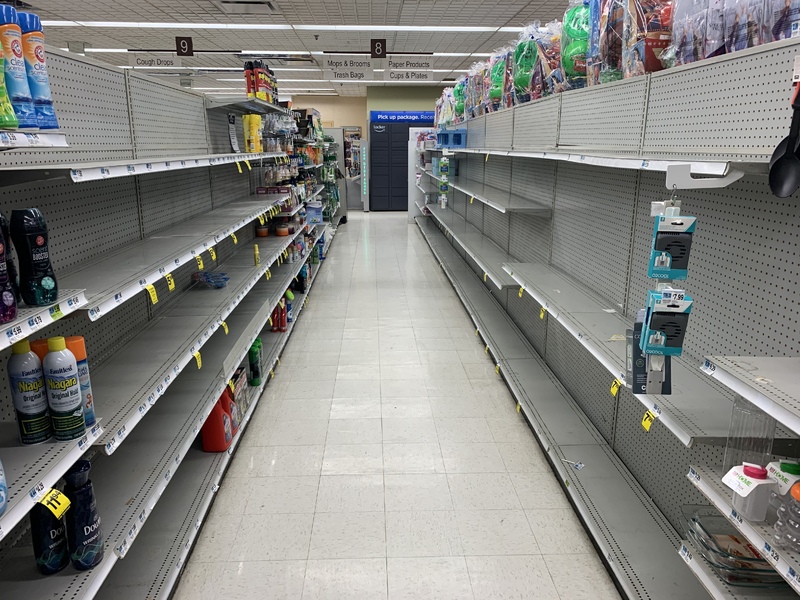 March 2020
March 2020Unprecedented wiped-out store shelves
As I remember now, around mid of March 2020 my undergrad school pushed all students and faculty to an immediate break while college administration had figured out the transforming in-person classes into online ones. Meanwhile, I was thrown into a new reality of Covid19 lockdown in NYC. As a part of it, there were empty shelves in supermarkets and grocery stores. On the first days of the officially declared lockdown, supermarkets became rapidly overcrowded by New York residents who had to rush to buy essential food supplies that could be preserved for a long time. The atmosphere of common panic at the beginning of the pandemic and lockdown seemed to be everywhere in New York. Hence, supermarket shelves naturally turned to be aisles with wiped-out shelves. Besides the essential foods, toilet paper and disinfection items (sanitizers and wipes) also run out with the speed of light. During the lockdown times, I remember challenges in finding these sanitizing wipes and sanitizers in the stores which were extremely needed. I made a joke once in my conversation with a store employee that I would have a time machine to travel to the recent past and buy all needed things and return. Supermarkets’ management decided to limit the sales items to avoid the absolute lack of necessary products in their stores. I could never imagine seeing such a lack of necessary food products in an economically advanced country like the US. In contrast, today and in pre-Covid times I did regularly head to do shopping in supermarkets, and I was able to view fully packed shelves and fridges with all types of various foods and products. -
2023-01-22
COVID Restrictions and Visiting Mom.
My mother has special needs and since 2014, lived in a townhome with three roommates, facilitated by Penn Foundation, a behavioral healthcare provider. I lived only 10 minutes away, and once a week I would visit her on my days off. I would bring fast food or pizza and we would watch movies together in her room. When the pandemic began, Penn Foundation - like most other healthcare facilities - imposed tight restrictions for the safety of those under their care. As a result, I was unable to visit my mother for half a year, and after restrictions were loosened, our visits were relegated to sitting on her front porch eating and talking. Due to a deterioration in her condition, she was moved to a nursing facility. We never got to have another movie day. The pandemic had changed the way I visit my mother forever. -
2020-07-13
The Last Man on Earth
I run almost every day. During the summer of 2020, I was undergoing prostate salvage radiation therapy. Radiation therapy is sometimes proscribed after one has their prostate removed. I ran no less during the prostate radiation therapy. I've always eaten healthy food. Still, I drank water more regularly during radiation therapy. Driving from my home to the Anderson Cancer Center was an enjoyable experience, mostly because the freeway was so deserted–there were almost no cars on the road. I live in uptown San Diego, so my long runs take me through downtown San Diego. Before each run, I spend a few minutes practicing martial arts. I imagine the neighbors watching me thought I was having some kind of fit. After warming up with martial arts, I start my run. The first place my run takes me is through the Hillcrest community, usually a place with the lively hustle and bustle of people moving about, but on this day, Hillcrest was deserted. Most restaurants were closed, and a few people were milling about–Hillcrest was a ghost town. It reminded me of the town portrayed in the 1973 film High Plains Drifter. Folks were hiding, hiding from COVID by hiding from each other. From Hillcrest, my run took me through downtown San Diego where the streets were equally deserted. The deserted streets reminded me of running through another movie, the 1964 film, The Last Man on Earth. I imagined inhuman monsters were preparing to spread COVID that would spring into action without warning. Of course, all this fantasizing made my daily run even more fun and pleasurable. I could let my imagination wander momentarily, then return to the peaceful meditation of running through deserted streets. The COVID protocols made possible the escape from the COVID reality itself. I'm convinced the long runs played a vital role in mitigating the effects of radiation therapy. -
2020-03
Zoom, Kraft Mac & Cheese, and Avatar the Last Airbender
These three things basically sum up how I spent my days during the lockdown of the pandemic. I would go on Zoom for class, would typically make some Kraft mac & cheese for lunch or dinner, and would binge watch Avatar the Last Airbender on Netflix. Sometimes I did a combination of both; I remember eating mac & cheese and playing hangman with my friends on Zoom. These are three things that I associate with quarantine. -
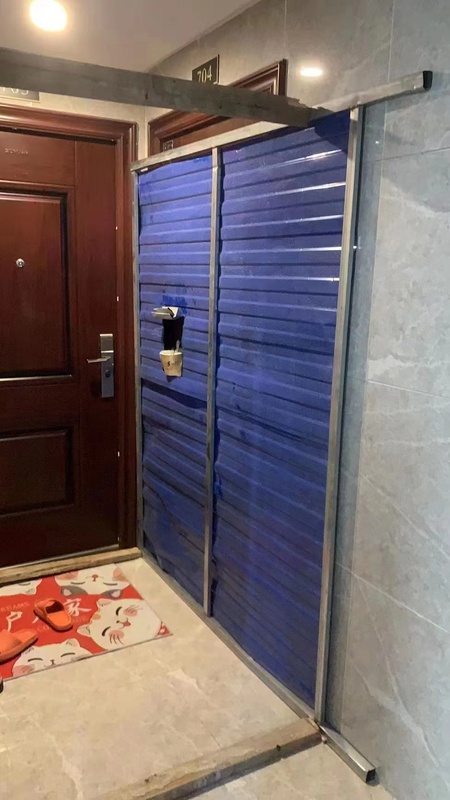 2022-10-10
2022-10-10HIST30068 China’s Zero Covid Policy Story 4
A door in the neighbourhood is nailed, to stop people with positive cases from going outside. I found it a bit uncomfortable, and I really feel sorry for the people inside. -
 2022-10-10
2022-10-10HIST30068 China’s Zero Covid Policy Story 2
A road near my home in China is closed. Workers are building a wall across the road to stop any travels. This road had much of my childhood memory: it's very close to the “Palace of Culture”, a Sunday School where many kids went to take math, Chinese, English, art or music classes. On the other side of the road there was my favourite noodle soup shop, also closed. -
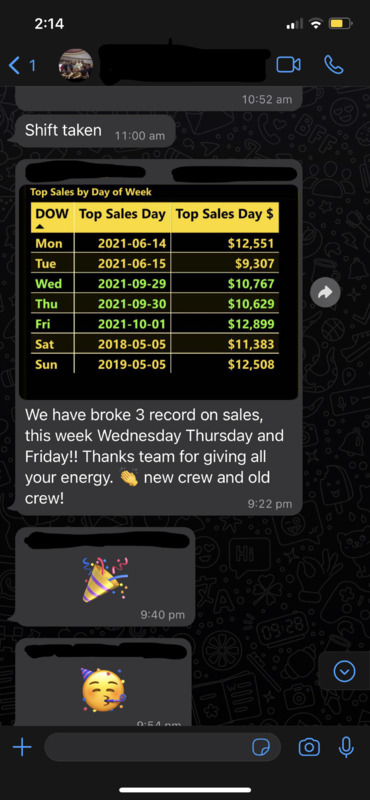 2021-09
2021-09Rising Profits
HIST30060: This is a screenshot of a whatsapp group chat for the workplace I was in during the sixth COVID lockdown in Melbourne. Despite restrictions being at its highest at this point, the profits for my workplace broke new records this week, similar as to how other major companies raked in major profits during the lockdown era. I remember working that Wednesday night, me and the few coworkers I was with were inundated mostly by online delivery orders but there was still a steady stream of customers coming in (quite often without masks) to order in person. There was little reward for our efforts, but at the very least I was afforded some peace and quiet on the commute home with the lockdowns in place. -
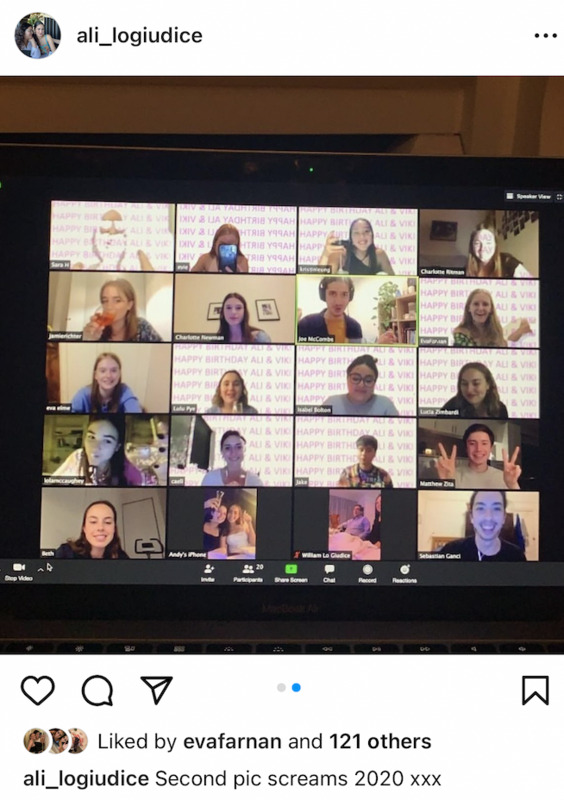 2022-10-31
2022-10-31Reflecting on COVID19 as a student who started and ended her degree in the midst of the global pandemic. (HIST30060)
I’ve selected 5 different photos which give a little insight into being a tertiary student during the COVID19 pandemic. I started my Bachelor of Art degree in March of 2020, fresh out of high school. I was so incredibly excited and had a great first few weeks (I think one or two) and O-Week. I was lucky enough to go on a first year Arts student camp in February, where I made a handful of friends that I am still close with today; it was this small social interaction that really served as the bulk of my Uni social life for my degree because ‘going online’ severely stunted my ability to connect with new people. In the screenshot of a Zoom conference call, I am having a zoom call with some of the people I meet on this camp, a kind of ‘reunion’ during the first lockdown in 2020. Reflecting on some of the other limitations on the social life of a young student who is very social, I have included a screenshot of an Instagram post I did in April of 2020. It was my 19th birthday, and my ‘obligatory’ birthday post for the year looked a lot different to other years. Rather than being out celebrating with friends in real life, we did a group zoom call where we sang Happy Birthday and my friends watched me cut my cake through a screen. Some people got dressed up, donning dresses and a full face of makeup, to just wash it off when you clicked the camera off for the night. It was lovely to connect but looking back at these pictures now just leaves me with a strange, eerie feeling. I have included a picture of my university set up, a table in our garden and my dog, Margot. I found it really hard to study in my house all the time, so I would often try to move around to different study zones in my house. I really focused on my study during lockdown, it felt like it was a productive use of time and something I could channel my thinking into. However, thinking so much about University, and always having it in my home (it was not like I was moving between a ‘home space’ and a ‘study space’) was really tiring and draining. Every day just felt the same. I have decided to take a gap year next year rather than moving straight into post-graduate study because I don’t want to feel that same kind of burn-out again. Finally, I have two pictures which encapsulate some pass times during lockdown. One is my sister painting my bedroom walls; we did a lot of home improvement and beautification, giving ourselves little tasks and jobs that we could complete and feel satisfied with. The other picture is my sister and dog on the beach during a winter’s eve walk. I included this picture because her mask is visible. This picture was taken when there were restrictions about the quantity of family members you could walk with, the time you could leave your house, the necessity of wearing a mask and how far you could go from home. When this picture was taken, we had a curfew in place in Victoria (I think you had to be home before 10pm), you could only walk with household members, but only in groups of two at a time, you could not go further than 5km away from your home and you had to wear a face mask even when just walking your dog to a quiet beach. Reflecting on these harsh rules and the feelings I had at the time makes me feel quite sad as I feel like I missed out on so many experiences that I was promised with my university degree. My experience as a Bachelor student was so far from what it should have been; so while I am extremely proud to be graduating in a few weeks, proud that I loved what I studied, felt empowered by what I learnt and feel like my academic skills have improved so much, I feel sad that I missed out on social connection, a sense of belonging to a school community, meeting people who are outside my regular circles, experiences with clubs and teams, not being able to use campus facilities and spaces. I am so lucky that I was extremely privileged in the lockdown, my family was all healthy, safe, we had minimal arguments, and they made me smile despite the circumstances; my friends were beyond wonderful, and I had a safe place to live and access to my university and learning online. But when I think back to the lockdowns and the impact of them, I still can’t help but get emotional. More than anything, I always find myself shocked about what we all went through and how unique it was. -
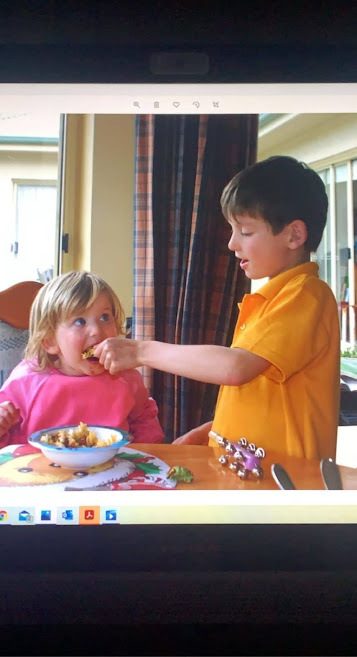 2021-08-08
2021-08-08Revisiting the family archives - HIST30060
In isolation, I found myself coming closer to my family. I was living in Melbourne at the time, away from my home in Tasmania, but maintained constant connection via video calling and messaging my family. One way I connected with home was by sharing old photos with my sister. This is one she sent me while I was in lockdown. It was taken around 2008. Trawling through thousands of old photos was an easy way to keep occupied during lockdowns, and I’m partially glad that COVID gave me the free time to do so as it was a fun way to bond with family and massage out the homesickness. -
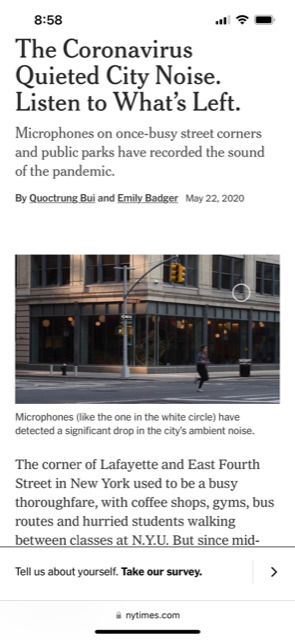 2020-05-01
2020-05-01The Hustle and Bustle That Went Naught
This story is nothing that many of you may not be familiar with, notably of those in metropolitan-like areas. Plus, I can not say that this story is anything deeply descriptive and the likes thereof, but it certainly had an impact on someone like me (along with others) that live in a city, notably if you are especially in or around New York City, the city that never sleeps. What brings me back to this? Well, not exactly the link that I provided that actually shows (at the time of course) a live-time recording of midtown Manhattan and its eerie sound, which is paradoxically a "sound" of a hovering-like quiescent stillness of keen silence (but a silent ambiance that was somewhat peculiarly enchanting) . Or rather, as the title alludes to, a sound that was "naught". At the time, it became so normal if you will (especially around 40 days since the lockdown went into effect), that it became a coincidentia oppositorum of sorts. One might ask, where is such a "unity of opposites" in effect whereby this was simply a "change" in the dynamics of your "said" environment? To start, the Newark (NJ) area is nothing BUT a concoction of familiar and somewhat pleasing noise as I sit in my half-airconditioned room, from the constant sound of public transportation busses passing by and their intrinsic slight familiar screeching stop, the talk of those a few floors down walking the streets, the constant sound(s) of cars flowing by, the sound of the famous pathway train into NYC in the faint distance (though it stops at Jersey City first), those at the corners (as inappropriate as it may sound) calling out that they got "x, y, and z" near Broad and Market Street, so forth and so on, to "almost" nothing! It was like something straight out of the novel Brave New World and other such pally stories of the sort. To me and many others around our surrounding areas, this was a moment in history that stood out, one that I can not recall in similarity since Tuesday, September 11th. 2001. Because the unity of these non-coherent opposites is in the simple fact that the innate aspect of a pandemic lockdown of a such magnitude as we had is quite obviously "silence" if you will, which is the opposite of what is immersed in a city of almost 300,000 (and that is of course not including the amount of citizens in neighboring metro-areas both east, north, and south of my location), nevertheless, they formed one coherent form of a dialectical force. Because it soon became a "norm" and it happened at quite an expedient rate in the larger scheme of things. Nothing was more "quiet" and "surreal" then the tragic events of 9/11, as it did not take some time for a similar situation to occur, as the event was so dynamic that everything I am speaking of happened at once, but and more importantly, day by day the city quickly gained back its ingrained normative environment. But the reason I arbitrarily picked the date of 5/1/2020, rather then use the date of the article, is because it was in early May where this began to slowly engulf me and took me back to one quite sunny day around noon (maybe a tad later), where all of this, "all of this" being that of what I speak of, struck me finally as something transformative (but far less than cathartic to say the least). I hope you enjoyed my little tidbit of what kind of impact COVID had on me (be it a self-like precept, photograph, video, etc...), particular using my experience in a sensory course of description. Sure, there was obviously other aspects that came into play with COVID-19 that eventually impacted us, but most of them were later on as the days moved by, while rather this experience was the first and the one that will stick with me anytime I think back to the pandemic. And the beauty of it, or rather lack thereof, all happened while simply sitting near my bed (hence against the window) while putting on my prosthetic legs. Cheers to you all! -
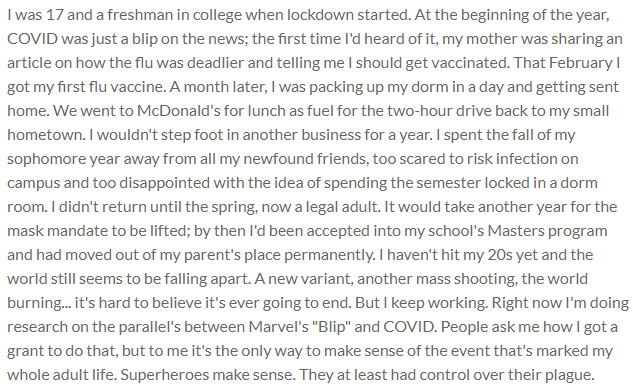 2022-07-06T10:19
2022-07-06T10:19Adulting On Lockdown
I was 17 and a freshman in college when lockdown started. At the beginning of the year, COVID was just a blip on the news; the first time I'd heard of it, my mother was sharing an article on how the flu was deadlier and telling me I should get vaccinated. That February I got my first flu vaccine. A month later, I was packing up my dorm in a day and getting sent home. We went to McDonald's for lunch as fuel for the two-hour drive back to my small hometown. I wouldn't step foot in another business for a year. I spent the fall of my sophomore year away from all my newfound friends, too scared to risk infection on campus and too disappointed with the idea of spending the semester locked in a dorm room. I didn't return until the spring, now a legal adult. It would take another year for the mask mandate to be lifted; by then I'd been accepted into my school's Masters program and had moved out of my parent's place permanently. I haven't hit my 20s yet and the world still seems to be falling apart. A new variant, another mass shooting, the world burning... it's hard to believe it's ever going to end. But I keep working. Right now I'm doing research on the parallel's between Marvel's "Blip" and COVID. People ask me how I got a grant to do that, but to me it's the only way to make sense of the event that's marked my whole adult life. Superheroes make sense. They at least had control over their plague. -
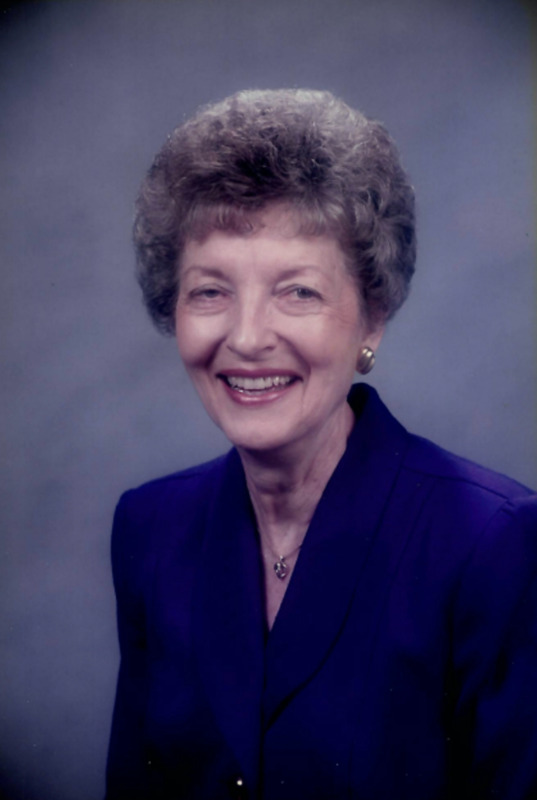 2022-07-02
2022-07-02Taking Care of My Grandma During COVID
This is a story of taking care of my grandma during COVID. A lot of the time I was employed as a caretaker for my grandma overlapped with the height of COVID. -
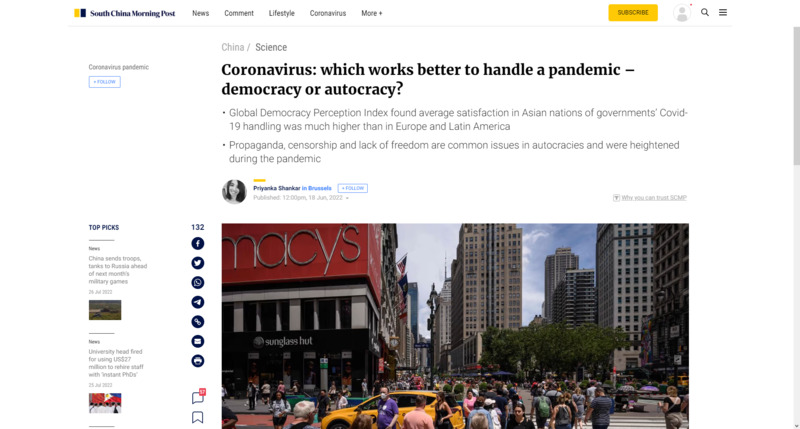 2022-06-18
2022-06-18Coronavirus: which works better to handle a pandemic – democracy or autocracy?
This is a news story from the South China Morning Post by Priyanka Shankar. This article is discussing the difference in responses based on forms of government. When it came to handling the pandemic, people from Asian countries where restrictions were much tougher rated a higher rate of satisfaction in government response compared to Latin America and Europe. This was taken from the Democracy Perception Index. According to researcher Fredrick DeVeaux, a leader in conducting this survey, the tight restrictions common in Asian countries are generally accepted because it gets associated with low death rates. The survey does make mention that in countries such as Iran and China, they hid data about the virus from their citizens, affecting their overall response to changes in lockdowns. However, Singapore is also authoritarian, and the prime minister has made an effort to create transparency in what is occurring, so items get hoarded less. Overall, the article claims that the mass mobilization of people and goods under authoritarian regimes fares better than democracies do at creating an effective COVID response. -
2020-03-19
LockDown
So this was the beginning of lockdown for covid-19 when it first started to get out of hand, I was trying to start my first year at my new college DePaul University. Yet it was going to be online for the first year and that is when it started to get rough from all the work I had to get done with little to no help at all from professors. They weren't opposed to helping it was just the fact that we could only find them in office hours and after class online and most of the times it was software problems that would take so long to be fixed to where it would take almost a couple of weeks to fix. When if it wasn't for covid I would be able to go in and fix it asap. It's just that the reason for this is because Covid can really affect ones learning progress and if it's something tech related it really can cause a delay for many not just students but office workers and professors etc. -
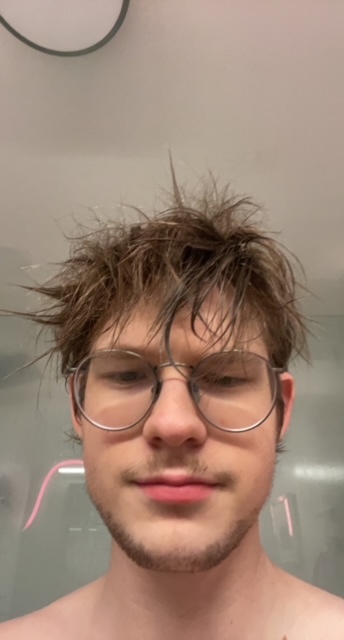 2022-06-11
2022-06-11Do we have to go out again?
I am an anxious person. Before covid it took all my energy to get up in the morning, put on decent clothes, go to school, meet with friends, go to restaurants. The lockdown was the best thing that ever happened to me. My best buddy moved in with me and my family, my classes went online, I slept more, I gamed all the time, we got takeout. Now I'm being invited places. I have to reinsert. I miss covid. -
2022-06-10
Lockdown Experience
What’s it like living in lockdown? Everyday felt like a cycle, especially online school. You wake up: -Turn your laptop on -Eat -Sleep - Defecate and repeat No leisure activities on the weekends, like we used to have. You're separated from socialisation, family, and friends. So you start to try new hobbies. Or instead, rot in your hobbit hole (bedroom). If I'm being real, I spent my lockdown in a big t-shirt and walking around in my underwear. Skateparks were closed so I skated in my driveway and neighbourhood. All my neighbours could hear was the slamming of my board, and ahhhh. I eventually switched to skating in my garage, and then just stopped skating as a whole. I tried writing screenplays, which were terrible. Lockdown was separation from people to people contact, boredom, weight gain, and extremely long screen time. I’m glad it’s over, but I definitely learned a little bit about myself. The fact that everyone else was in lockdown made it a lot more doable. -
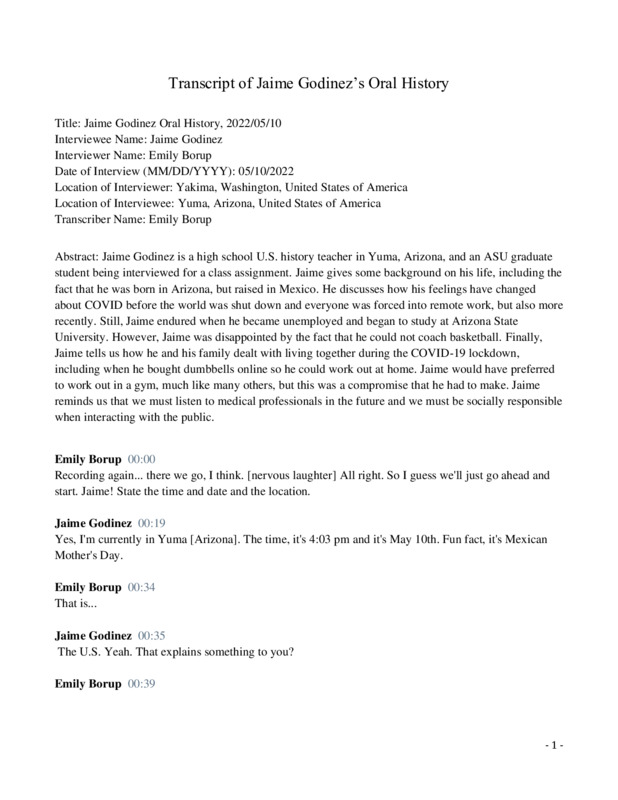 2022-05-10
2022-05-10Jaime J. Godinez Oral History, 2022/05/10
Jaime Godinez is a high school U.S. history teacher in Yuma, Arizona, and an ASU graduate student being interviewed for a class assignment. Jaime gives some background on his life, including the fact that he was born in Arizona, but raised in Mexico. He discusses how his feelings have changed about COVID before the world was shut down and everyone was forced into remote work, but also more recently. Still, Jaime endured when he became unemployed and began to study at Arizona State University. However, Jaime was disappointed by the fact that he could not coach basketball. Finally, Jaime tells us how he and his family dealt with living together during the COVID-19 lockdown, including when he bought dumbbells online so he could work out at home. Jaime would have preferred to work out in a gym, much like many others, but this was a compromise that he had to make. Jaime reminds us that we must listen to medical professionals in the future and we must be socially responsible when interacting with the public. -
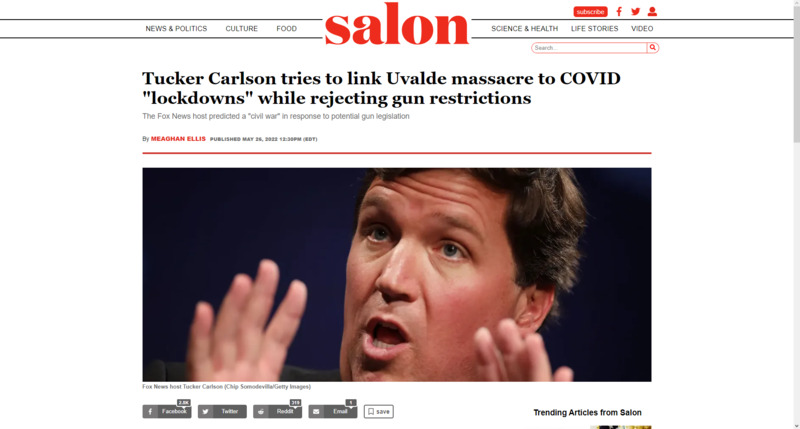 2022-05-26
2022-05-26Tucker Carlson tries to link Uvalde massacre to COVID "lockdowns" while rejecting gun restrictions
This is a news story from Salon by Meaghan Ellis. This is an opinion piece on what this author thinks about Fox News contributor Tucker Carlson and his approach to the shooting in Texas. The news story says that Carlson claims the lockdowns increased mental illness cases. Whether this is true remains to be seen, but from my own experience with lockdowns, I did have trouble adjusting. I had at least a few mental breakdowns over feeling like a prisoner in my own home. I don't think the lockdowns would trigger everyone into becoming a potential mass shooter, but I do not think they were healthy for many people either. People need human contact regularly, and being cut off from that and only having social media or very few people to see in-person would feel isolating. I think mental health is not paid attention to enough by public health officials when it comes to lockdowns. Mental health is still part of overall health. I do understand why the lockdowns happened, but I think many went on too long, which has had a bad effect on society. It is obviously not the only reason someone would have a mental illness, but for people that already did have mental issues, it made them worse. I have high functioning autism and without a good support system, I'd possibly be doing way worse. -
2020-03-23
Solid Wall of (No) Sound
I was a college student during the initial phases of the pandemic. Classes were moved to all online, and I moved out of the dorm back home, since most of the campus was closed. My most distinct memory of the time is of walking my dog on the first Monday morning of the lockdown. The world was so still. The only soft noises that could be heard were birds chirping and squirrels chittering to each other as they ran around. I lived right next to a major road, so the sudden silence was almost oppressive. That vacuum of sound was the loudest thing I heard on the walk, and it came with the sudden awareness that the area I was walking in was completely alien to the one I had grown up in. I have visited home again since then, but have been completely unable to ever capture that eerie feeling again. It felt special, like a completely ethereal place in time that would never be recreated again. -
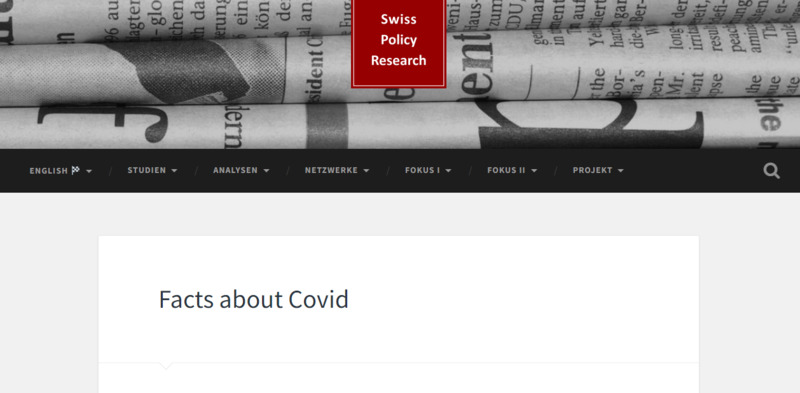 2022-05-15
2022-05-15The Nature of the Covid Skeptic
This is an interesting article I have found detailing 20 "facts" about the Covid-19 pandemic. This article largely attempts to refute the "overreaction" of the world when it came to the covid-19 pandemic. While criticism of conduct and policy is valuable and necessary for an open and clear discussion, attitudes of pandemic skeptics largely negate the vulnerable populations of the world and feed on the ignorance of the global population. This is one such article. 1. This article claims the lethality of covid is generally less than 1% of the population. While I seriously question that number, it still does not negate the extreme death seen by the world. The United States of America has roughly 331 million people living within their boarders. 1% of 331 million is still 3.31 million deaths. Is this a number in which it is appropriate to have an "it is what it is" attitude? Particularly when the people most impacted by the pandemic are those with health issues and the elderly? This attitude, which is shared by many skeptics borders on ageism and ableism. 2. This article claims that those most adversely impacted by covid are those over the age of 80 (78 in the US). But I ask again: is this a valid reason to not take the pandemic seriously? Are we supposed to let the elderly population simply waste away under the boot of covid? 3. This article claims that the covid-19 vaccine is ultimately ineffective in protecting against infection or transmission. The plain truth is that nothing is 100% effective. Seatbelts are not 100% effective in preventing deaths in the event of car accidents, so should we stop wearing them? Additionally, once the vaccines began rolling out, we have seen a decline in covid cases. Indeed, that is not to say vaccinated people don't get covid, I myself being one of them, but it has certainly made covid much more manageable, particularly on the already strapped healthcare industry. 4. This article claims that the vaccine can cause fatal reactions. As can the flu vaccine, or the polio vaccine, or any vaccine. It varies from person to person. 5. This article lays blame for increased mortality on the feet of covid lockdown procedure. I would simply say that correlation does not equal causation and I am certain the increased mortality rate can more accurately be attributed to the millions who have died from covid-19 across the globe. 6. This article mentions that in most cases, individuals were asymptomatic or only had mild to moderate symptoms and that obesity played a major part in whether or not symptoms were severe. While I doubt the validity of this, even so it does not negate the precautions the world took. Should asymptomatic people not take precautions and isolate? Should they be free to wander and infect those who could be vulnerable and perpetuate death? I feel this attitude, again, negates the vulnerable population. 7. This article claims that early treatment of the disease prevented hospitalizations. I feel this point negates the rapidity of covid's effect on people. Indeed, it also assumes that everyone has equal access to early-stage treatment. 8. This article claims that 10% of symptomatic people may experience long-term health related issues following covid. This appears to be about the only accurate point of this article, the only thing i question is the percentage of the population. 9. This article claims that the ability of transmission is very limited. This is very inaccurate, particularly when one looks at the extensive number of the population who received a positive test. 10. This article claims that masks had zero impact on limiting transmission. There are countless studies disproving this point. Often times this attitude is held by individuals who care only about their own comfort rather than the people around them. 11. This article claims that lockdown's were ineffective and only perpetuated economic issues across the globe. I think New Zealand is a prime example of why this is a moot point. New Zealand locked down early in the pandemic and did not have a single case of covid for nearly a year. It was only when their borders reopened that new Zealand began to experience covid. 12. This article claims that the impact of the virus on children is miniscule and that school lockdowns did nothing to help stop the spread. It is idiotic to think that children cannot contract covid. Indeed it is further selfish to not factor in teachers and staff and their health. 13. The article claims that PCR tests often returned false positives which artificially increased the number of cases. This is deeply inaccurate as there are numerous studies highlighting the effectiveness of PCR tests. 14. This article claims that contact tracing is ineffective and cites a WHO 2019 paper on influenza tracing. Contract tracing is valuable in informing the population that they have been exposed so that they may get tested and limit their contact with others to limit the spread, it is most certainly effective. As for the 2019 WHO paper on the ineffectiveness of contact tracing for the influenza: different disease, different way of managing it. 15. The article claims that vaccine passports are ineffective as the vaccine is ineffective and are used for tracking the population. Again, the vaccine has proven to be effective. And if the government wanted to track the population, it can be far more easily be done via phones and computers than via vaccinations. 16. This article claims that mutations of covid occur frequently and that new variants decline in lethality. While I agree that the virus mutates, I seriously doubt the decline in lethality. Indeed, I think because the virus can mutate so effectively, it is another justification in taking the pandemic seriously. 17. This article cites Sweden as a case where a full lockdown did not occur, a small number of deaths, and deaths being largely attributed to the elderly population. I think the primary effectiveness of Sweden this article cites is due to the Swedish taking the pandemic seriously, wearing masks, rapid vaccinations, social distancing, and not perpetuating misinformation. 18. This article claims that seasonal influenza largely disappeared during the pandemic and that covid has displaced it as the seasonal virus. Seasonal viruses aren't displaced. Indeed, the reason for the decline in flu cases is due to the population wearing masks and social distancing. Seasonal flu returned to pre-pandemic numbers in fall and winter 2021 when many of the covid protocols had been removed. 19. This article claims the media blew the pandemic out of proportion, spread fear, and distorted information. I disagree. It is the job of the media to make the population aware of global issues such as this. Indeed, the only distortion of facts that I found during the pandemic were from pandemic skeptics who were too selfish and uncomfortable to consider their fellow humans. 20. This article claims that the virus was lab-created. Whether or not the virus was lab-created is irrelevant. The point is: it exists, it is here, and it is vital that it be taken seriously. -
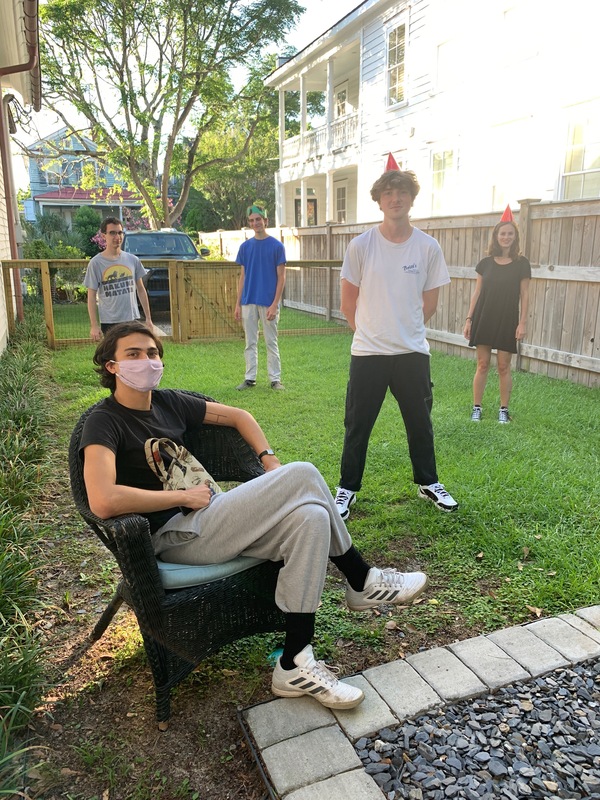 2020-06-03
2020-06-03Covid Birthday
My 21st birthday was just a few months into lockdown. Like millions of other people, something I was looking forward to was affected (not ruined) by the pandemic. There were so many instances of things changing due to the circumstances that we had to stay positive about how we viewed the adjustments. Thankfully I was still able to see my friends although we were keeping our distance. In the photo, you can see all of my friends and I standing far apart from each other in my yard. This was just one pandemic event of many to come. -
2020-07-14
Love in Covid 19
My roommate and I agreed because we felt that owning a puppy would help us cope with being confined at home, but then my buddy stated she would not return and hoped that we would adopt it immediately. After a year, my roommate unexpectedly informed me that he wanted to get a large dog. My roommate, by the way, is more scared of dogs than I am, but after a year of getting along, he has progressively become less afraid of dogs. So we went to the Pima Animal Center's kennel in search of a suitable dog, eventually settling on a Belgian Shepherd. Having these two dogs has brought both delight and stress to me and my housemates. -
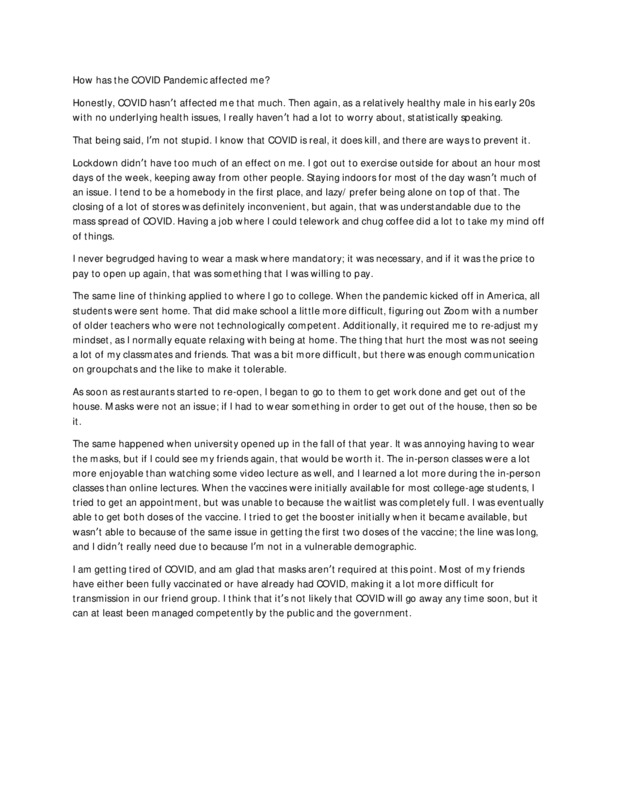 2022-02-01
2022-02-01How I've dealt with COVID
My feelings and how I've dealt with COVID and its restrictions -
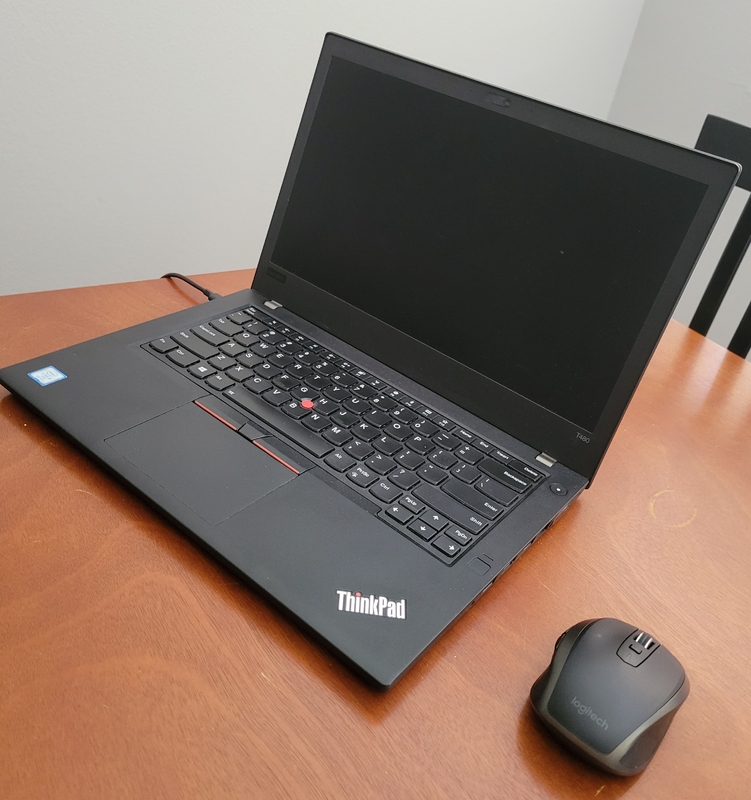 2022-05-07
2022-05-07Our Link to the World
This photo is of my trusty laptop that got me through the pandemic. During the lockdown, I actually had to travel a lot for work. During my travels this laptop kept me linked in with work, school, and my family. Though my particular COVID story is different than most, I believe that my object is relatable to a lot of people. Many people can relate to having to telework, being forced into online school, and only being able to contact loved ones remotely. While remote working, learning, and conversing is nothing compared to real life, technology played a large role in our lives during COVID and I cant imagine how things would have been without it. -
2022-05-07
Covid
I have never been one who went out and played or had activities. I like to play video games. However, during the past couple years everything has been pretty tough on everyone. I find myself getting frustrated that many places are closed to me and how boring college life is. I started college two years ago and it was miserable. All there was to do was just to sit in my dorm and play games, watch movies, and do homework. There wasn't any fun in college anymore with the effects of covid. As of now I feel drained in almost every way possible, I am usually an A student and now I am becoming a more C student and it frustrates me and angers me yet I still can't find any motivation to try harder. With the past couple of years all I would like to do is just take a break from everything and just work for a year or so then jump back into it. -
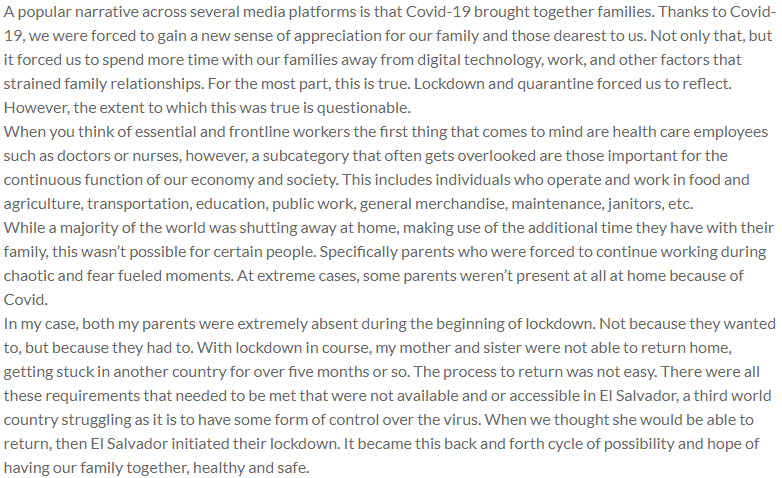 2022-05-04
2022-05-04Families during COVID
A popular narrative across several media platforms is that Covid-19 brought together families. Thanks to Covid-19, we were forced to gain a new sense of appreciation for our family and those dearest to us. Not only that, but it forced us to spend more time with our families away from digital technology, work, and other factors that strained family relationships. For the most part, this is true. Lockdown and quarantine forced us to reflect. However, the extent to which this was true is questionable. When you think of essential and frontline workers the first thing that comes to mind are health care employees such as doctors or nurses, however, a subcategory that often gets overlooked are those important for the continuous function of our economy and society. This includes individuals who operate and work in food and agriculture, transportation, education, public work, general merchandise, maintenance, janitors, etc. While a majority of the world was shutting away at home, making use of the additional time they have with their family, this wasn’t possible for certain people. Specifically parents who were forced to continue working during chaotic and fear fueled moments. At extreme cases, some parents weren’t present at all at home because of Covid. In my case, both my parents were extremely absent during the beginning of lockdown. Not because they wanted to, but because they had to. With lockdown in course, my mother and sister were not able to return home, getting stuck in another country for over five months or so. The process to return was not easy. There were all these requirements that needed to be met that were not available and or accessible in El Salvador, a third world country struggling as it is to have some form of control over the virus. When we thought she would be able to return, then El Salvador initiated their lockdown. It became this back and forth cycle of possibility and hope of having our family together, healthy and safe. My father on the other hand had to continue showing up to work, working ridiculous hours. When the whole world including my father was consumed by fear and confusion, there was no room to process and plan. My father, an employee of a multinational beverage corporation, experienced no change in his routine. On the contrary, besides wearing a mask, everything remained the same; crowded working spaces, no social distancing, etc. My sisters and I questioned why he continued to go to work knowing the danger that posses to not only his health and safety but also ours. His reason was “because the world doesn’t stop. There are still expenses and bills to pay regardless so not showing up is not an option.” This made me question just how many parents continue to work because they need the money to survive, especially at the beginning of the pandemic when many businesses were taking advantage of the short supply of items such as disinfecting spray, wipes, toilet paper, etc. and committing price gouging, knowing people were desperate for such things. That being said, stories as such continue to expose the disproportionate disadvantages that many low income communities and working classes face. Not only that but the additional strains placed on several families because of Covid and just how important resource and accessibility is. -
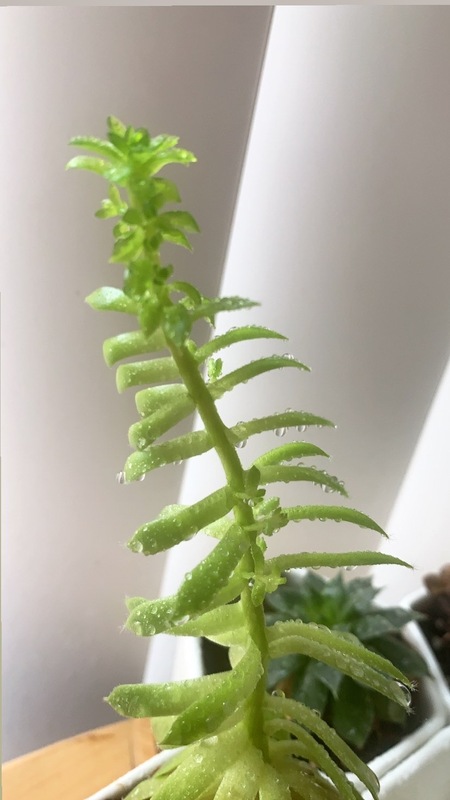 2020-03-18
2020-03-18All Things Will Pass
On this day, I recall watering my succulent and staring out the window with grave uncertainty of what was to come and utter confusion as to what exactly was happening. The stock market had just crashed andante pumped back up within minutes and the news was flooded with death and infection rates rising as people began clamoring for grocery stores to hoard supplies. The past two years living through COVID has felt somewhat like the process of the Calvin Cycle that kept my succulent in this photo nice and healthy. Although it is nearly impossible to articulate what life has been like or what was observed over the last two years, one great lesson I gained is the understanding that nothing is forever. It is all temporary. As I watered my plant with sheer emptiness and mentally checked-out due to the shock of the situation at the time, I began thinking about the Calvin Cycle process that my succulent or any plants outside would go through as my species was in dire panic. The world seemed to have stopped and sped up over night, but life itself remained to be what it was. Then the thought occurred to me. All things will pass. Living through COVID the last two years has seen work-from-home jobs rise to masses. I left one job to work at another and found that this was the worst comfort and behavior our species grew to become adapted to. For once, it has made us disconnected from reality and from each other. By being disconnected, it creates an issue of empathy and connection. The mantra of "connected while away," was shared everywhere when COVID first came about, but two years later, this has become the opposite. An example of this was observing many downplay the deaths of people from the virus, yet become very emotional once it was one of their family members. This could be viewed under a quick search on Google for the Reddit page of "Herman Cain Award." Bringing this page up primarily serves to show that both sides of the COVID discourse became contradictory as both sides were insensitive toward death. Was it due to being separated? I'll allow you to consider this. Another interesting point observed during COVID was the rise of irrational spending and mass speculation. Alan Greenspan once called the mass speculation a product of "Irrational Exuberance." The premise of this best serves that of investing as it describes the investor enthusiasm which drives asset prices higher than they are worth. However, the same could be viewed through the grocery hoarding of toilet paper or food where people became highly speculative of how long thee lockdowns would be. This was also indicative of the housing bubble 2.0 in which the Federal Reserve opened massive quantitative easing and opened cheap lines of credit for many. The result created more greed as people began hoarding one of the basic needs of our species in housing. How can a species feel righteous commoditizing shelter? The answer is irrational exuberance. Unfortunately, the result of the quantitative easing has created a massive issue where as the time I type this, the 1Q GDP results of the United States is at -1.4% and the inflation rate is at 8.5%. The Irrational Exuberance may be spelling the end of this decade's journey of cheap credit as it appears we are now headed for another Recession the next quarter. However, despite all of this irrational exuberance and the great stress these past two years have brought, I can no longer complain. I have adopted and accepted the Stoic philosophical belief that we must care for our neighbors as this will all pass. History has proven to be very biased when thinking in retrospect, but I hope my current peers use this to improve the future. ....... also, I never mentioned the protests, presidential change, food shortages in Sri Lanka and Peru, or how we have a dollar shortage crisis that nobody is talking about. All things will pass. -
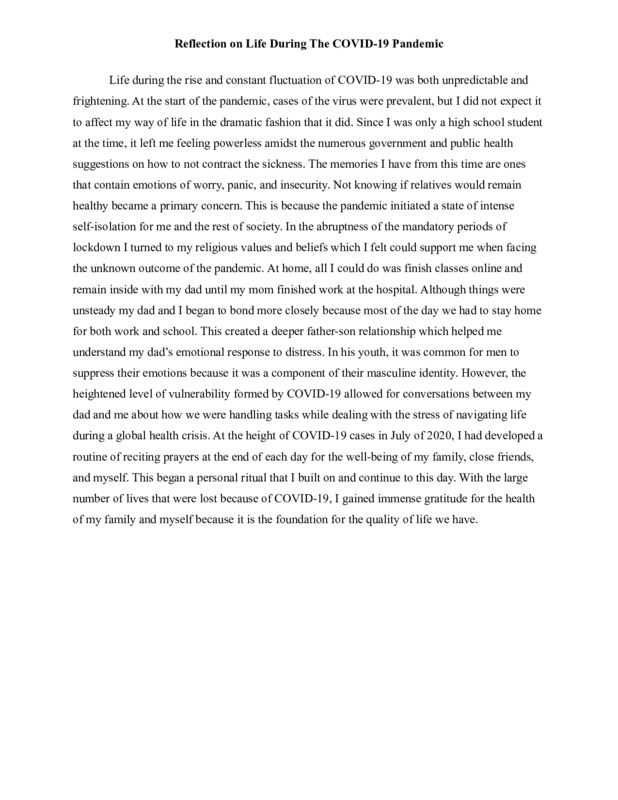 2022-04-29
2022-04-29My Experience of The COVID-19 Pandemic
Give a written account of how the COVID-19 pandemic affected my mental health, religious beliefs and personal relationships. -
2022-04-28
Covid
It may be neccessary to inform the reader that the following reflection was writing in the spring of 2022, at the end of the ‘pandemic’. The pandemic had began initially with my graduating from high school in the spring of 2020. Disappointed at not having prom or a real graduation ceremony, I prepared for college and ended up taking a gap year. The lockdown and safety measures enforced by the government and institutions around the country jointly impelled me to take a gap year. It was during this time that I began reflecting on life without social interaction, entertainment and structure. Perhaps the most apparent realization was coming to terms with the abnormalities wrought by the pandemic such as the lockdown and vaccine rollout/enforcement. The lockdown in particular, was quite pernicious. It prevented myself from going about daily errands and activities. Spiritually, I found comfort in reading scripture to cope with the deficit of worldly pleasure in my life. This was ultimately a good thing because it brought me closer to God. However, I was distanced socially from my peers and friends darkened my view of life and increased my pessimistic outlook. Man is religious because man was created by God. A lot of people dont find God and thus the suicide rate spiked durning the lockdown, damning many souls to eternal hellfire. -
2022-04-29
The Pandemic in the Military
When I found out about the start of lock downs and the fact that a pandemic was even happening, I was at the end of a training rotation at Fort Irwin, CA. My colleagues and I were extremely concerned about the welfare of our families as we had all been screened for symptoms, but there was talk of us not being able to return home until the DOD had figured out exactly how they were going to respond to the “sudden” emergency. I only put sudden in quotes because the government had plenty of warning that this was coming but decided that it wasn’t worth acting on until it had already started happening. Once home, the adjustment to a new way of life was akin to being dropped in a foreign country that speaks a language you don’t understand and has none of the customs you are familiar with. While families, dependents, and civilians had had warning, albeit minimal, that lock downs were going to be a thing and that masks were now mandatory regardless of where you were going, those who had been away without any media or contact back home, were suddenly thrust into the lifestyle of April, 2020. From that time to now, not only has vaccination and the reality of the virus become a contentious topic among coworkers, friends, and family, but what side of the issue you place yourself on has led to some of the worst division the nation has seen since the 1960s. Families have been ripped apart and friendships destroyed because the views expressed and sides taken on pandemic related issues, including the 2020 election, have adopted the same level of identity in our lives as our ethnic, racial, or religious backgrounds. Those who would have found common ground in shared religious belief, or shared culture now create new divides on the basis of believing that the vaccine works or not or believing that those who participated in the Jan 6, 2021 Capitol incident were justified or not. -
2022-04-29
How Covid- 19 has impacted my life
On the 11th of March 2020, COVID 19 was declared a global pandemic. With such an explosive magnitude and wide reach, the world braced for its impact. Lockdowns were set in place in every country, travel was shut down, and grocery stores were often out of many essential items. Many have lost their jobs or sources of income, Many of us have battled this virus and lost loved ones to it. For better or worse COVID 19 has changed us permanently. The impact of COVID-19 is observed in every sector around the world. It has affected education systems worldwide. After attending classes in person for the majority of my life the transition to being a full-time student online was not a simple adjustment. I encountered feelings of anxiety about my classes and was overwhelmed by having to move back home from the dorms. Thankfully the support from my family was encouraging. Being an online student has taught me more about time management than anything else and procrastination became a close friend. Missing out on class activities and gathering on campus have been discouraging. I felt as though I was missing out on the college experience and felt left out. It's important to remember while I am feeling these emotions so there are many more. Being able to connect with other people and share our experiences have opened up doors to new friendships. I would be lying if I said I did not have trouble going to sleep at night during these difficult times. Especially when I would constantly hear the news about how the elderly are more vulnerable to exposure to the virus. The thought of losing a family member is terrifying. Before the pandemic, I would often visit my family who lives in Mexico once a year during the summer, but traveling was no longer an option, the risk was too high. As times have passed I am more comfortable traveling and being able to see loved ones. Similar to schools, churches also went online. Before COVID I was really involved with the staff team at my local church. I constantly helped with volunteer activities, I helped in the kid's ministry, and I also helped with the church's coffee bar. With the transition online I lost the sense of community and fellowship. Many of the kids graduated out of the program online and it was difficult not to be able to celebrate in person. With every transition, I learned that adapting is the best form of survival, I cannot predict the future and I don't know what this year will unfold, but I will do my best to express gratitude for my health, and for my family’s health. -
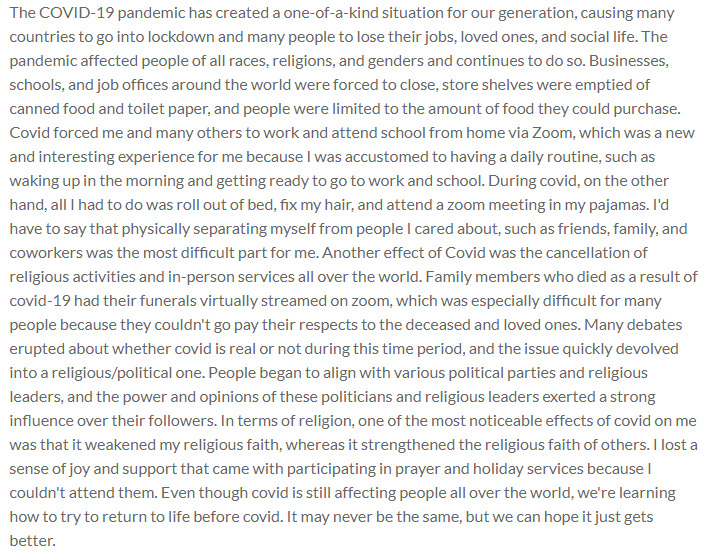 2022-04-28
2022-04-28COVID-19, Religion, and Public Life Reflection
The COVID-19 pandemic has created a one-of-a-kind situation for our generation, causing many countries to go into lockdown and many people to lose their jobs, loved ones, and social life. The pandemic affected people of all races, religions, and genders and continues to do so. Businesses, schools, and job offices around the world were forced to close, store shelves were emptied of canned food and toilet paper, and people were limited to the amount of food they could purchase. Covid forced me and many others to work and attend school from home via Zoom, which was a new and interesting experience for me because I was accustomed to having a daily routine, such as waking up in the morning and getting ready to go to work and school. During covid, on the other hand, all I had to do was roll out of bed, fix my hair, and attend a zoom meeting in my pajamas. I'd have to say that physically separating myself from people I cared about, such as friends, family, and coworkers was the most difficult part for me. Another effect of Covid was the cancellation of religious activities and in-person services all over the world. Family members who died as a result of covid-19 had their funerals virtually streamed on zoom, which was especially difficult for many people because they couldn't go pay their respects to the deceased and loved ones. Many debates erupted about whether covid is real or not during this time period, and the issue quickly devolved into a religious/political one. People began to align with various political parties and religious leaders, and the power and opinions of these politicians and religious leaders exerted a strong influence over their followers. In terms of religion, one of the most noticeable effects of covid on me was that it weakened my religious faith, whereas it strengthened the religious faith of others. I lost a sense of joy and support that came with participating in prayer and holiday services because I couldn't attend them. Even though covid is still affecting people all over the world, we're learning how to try to return to life before covid. It may never be the same, but we can hope it just gets better. -
2020-03-01
Covid-19 Life
When covid first began, it did not have a huge impact on my life and the lives closest to me. The two week quarantine was more of a vacation rather than a punishment to me and my friends. However, as the months went by and I was the only one that had to go back to work due to being an "essential worker" while my friends did not was a blow to me personally. I continued to work 40 hour weeks and lost thousands of dollars monthly due to the low pay and being in a sales job. My friends were in the restaurant business so they continued to get unemployment and made more than me. This was a very annoying to me. I would never hold that against them since I would have done the same thing if given the opportunity. As time went on, it became a different type of annoyance from dealing with people who refused to wear a mask and gave constant issues to me and my coworkers. Our company had rules and while I had to wear the mask 8 hours a day, the customers did a fraction of that and still would constantly complain. I understand they can be annoying but it did not affect their breathing like they claimed. I had a couple compare themselves to Rosa Parks by "refusing to wear a mask to make a change" which got under my skin. The way the American government went about preventing covid was done in a terrible manner and I am extremely glad we are past the true heart of the pandemic. -
2020-03-06
Senior to Sophomore
It was the Friday before Spring Break. Senior year, everyone is joyful with big plans to get out of the harsh Arizona sun. Rumors of a flu-like virus spreading in China were heard but never hit mainstream media which meant, not our problem. I was helping out at our school's Volleyball tournament that day, listening to the new Lil Uzi album that was hyped for so many years, life simply could not get any better. I had secured a good scholarship for college and was nearing the end of my last semester of highschool without a doubt in my mind, but it all changed so quickly. No one knew that would be the last time I saw my graduating class, that I would never have a traditional graduation, that our final plans for the last day of school were all worthless. I still remember the day as if it never ended, the day when everything in my life went upside down and the world was sent into a mass state of panic and depression. Seeing friends was near impossible as everyone was scared of what may happen outside. So many people that I graduated with and interacted with every single day, gone, never to be seen or heard from again. Though Arizona did at first avoid most lockdowns and mask mandates, luckily many people still took the necessary precautions. The first lockdown was possibly the most eventful and enjoyable as everyone was in the same idle and confused state with nothing to do and no aim as for where to go. The rise of a new app called TikTok took the world by storm and provided entertainment for everyone. It was a new place for everyone to connect and share ideas and surely enough, society was instantly hooked. It was the beginning of the new online semester of schooling alongside the second wave of lockdown here that truly began the depressive wave on all students. Many students, as well as I, still to this today are struggling to stay focused in online schooling and this meant very poorly educated and depressed students for over a year. No amount of aid from teachers or staff could cure this lack of socialization and the sole ability to make friends and connections that is required in schools. All of a sudden, fast forward from the middle of my senior year of high school to Sophomore year at university, life has done a full 360 and social interaction is a foreign language. Masks are required so no one knows who is who and friend groups are only for those that pertained throughout the pandemic. -
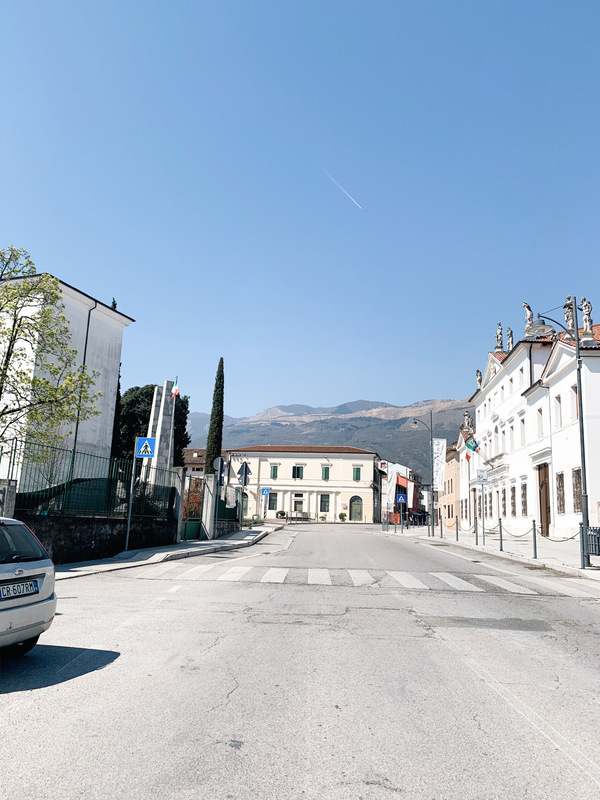 2020-03-26
2020-03-26ITALY Covid-19 Lockdown
In the summer of 2019, I officially went to Italy to live with my significant other. The transition to a new country was difficult, but I eventually made it. Throughout my adventure, I've met some wonderful individuals and seen incredible sights that I never imagined I'd see. The year 2019 was full of happiness, adventures, and meeting the most incredible friends whom I will remember for the rest of my life. My best friends from the United States came to visit me at the beginning of 2020, and we had no idea that as soon as they left, the entire country would be put under lockdown. Everyone has been talking about the COVID-19 and how it is affecting Asia as the beginning of March 2020 approaches. There was a word going around that we had a couple of cases in town, and those cases grew and swelled. Individuals did not possess masks, so everyone used whatever they had to cover their mouth and nose. The government announced a lockdown out of nowhere, masks were required to be worn inside the building, and people did not own masks. The government then declared a total lockdown, with people only allowed to leave their houses for essentials like the hospital, grocery store, or job. Except for grocery stores, nothing was open; whenever we leave our homes, we must fill out a paper stating where we are going and why, as carabinieri (police) are stationed throughout the city to stop those who leave their homes. Being stranded at home has its ups and downs, and it was critical to maintaining our emotional and physical health during this trying time. The lockdown lasted nearly two months, during which time Italy was placed under complete lockdown and declared a red zone. Everyone was suffering as a result of not being able to travel anywhere, much alone take a walk outside. It was a difficult situation, especially because we were in a foreign country and our families in the United States were concerned. When I went to the grocery store and stepped outside one time, it felt as if no one else existed; the roads were deserted, the air was still, and I felt as if I was the only one in the town. -
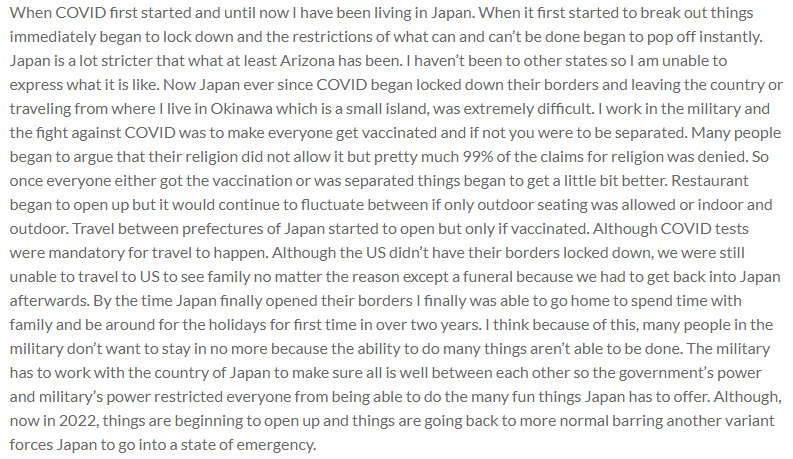 2022-04-27
2022-04-27Life of COVID in Japan
When COVID first started and until now I have been living in Japan. When it first started to break out things immediately began to lock down and the restrictions of what can and can’t be done began to pop off instantly. Japan is a lot stricter that what at least Arizona has been. I haven’t been to other states so I am unable to express what it is like. Now Japan ever since COVID began locked down their borders and leaving the country or traveling from where I live in Okinawa which is a small island, was extremely difficult. I work in the military and the fight against COVID was to make everyone get vaccinated and if not you were to be separated. Many people began to argue that their religion did not allow it but pretty much 99% of the claims for religion was denied. So once everyone either got the vaccination or was separated things began to get a little bit better. Restaurant began to open up but it would continue to fluctuate between if only outdoor seating was allowed or indoor and outdoor. Travel between prefectures of Japan started to open but only if vaccinated. Although COVID tests were mandatory for travel to happen. Although the US didn’t have their borders locked down, we were still unable to travel to US to see family no matter the reason except a funeral because we had to get back into Japan afterwards. By the time Japan finally opened their borders I finally was able to go home to spend time with family and be around for the holidays for first time in over two years. I think because of this, many people in the military don’t want to stay in no more because the ability to do many things aren’t able to be done. The military has to work with the country of Japan to make sure all is well between each other so the government’s power and military’s power restricted everyone from being able to do the many fun things Japan has to offer. Although, now in 2022, things are beginning to open up and things are going back to more normal barring another variant forces Japan to go into a state of emergency. -
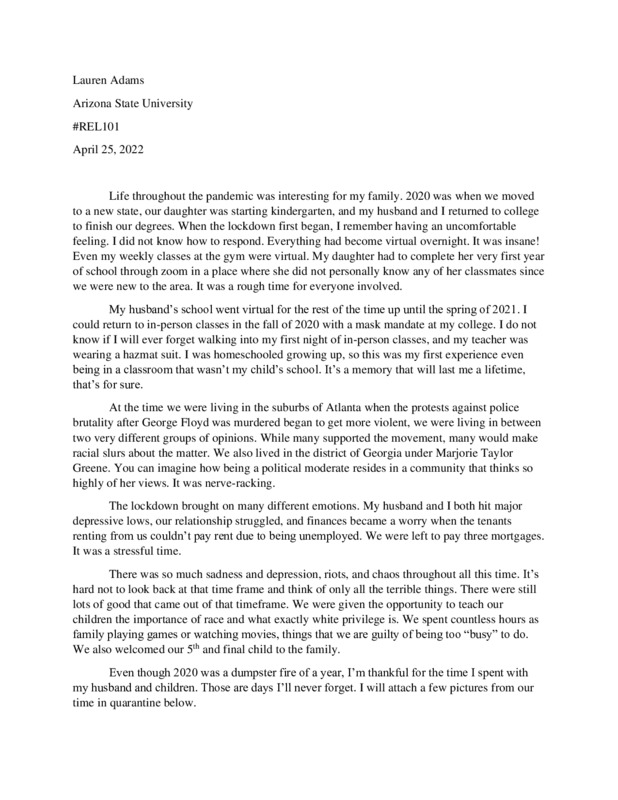 2022-04-25
2022-04-25COVID-19, Religion, and Public Life Reflection #REL101
this is a look through my point of view living in the year 2020
